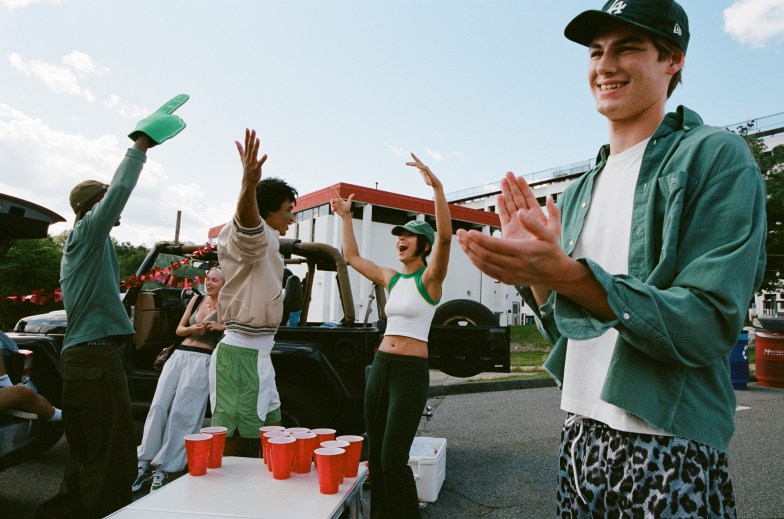After a challenging second quarter, Urban Outfitters is investing in UO College Shops, a multi-state marketing activation focused on comfort, college culture and curated experiences. The goal is to win back Gen Z. The brand’s core demographic is 18-30.
Shea Jensen, president of Urban Outfitters North America, said the Shops offer dorm essentials, items like the popular Bec skort and Champion-branded collegiate gear. The campaign kicked off on August 9 and will run through October at twenty schools.
“Gen Z is walking this balance between being a part of a community and expressing their individuality,” she said. “So we want to create spaces where students feel connected to their school while also expressing their own style through personalized, multifunctional dorm spaces.”
Each location features custom fixtures, signage and displays reflecting the local school’s colors, for example. The pop-ups are set in existing, on-campus Urban Outfitters shops at 20 of the largest U.S. colleges.
One of the biggest challenges Urban Outfitters has recently faced is its pricing. On platforms like TikTok, young shoppers often voice concerns over the cost of Urban’s products, especially when compared to fast-fashion giants like Shein and Temu.
On the second-quarter earnings call, Jensen addressed this, saying, “We believe our product assortment has unintentionally become too narrow in price, occasion and sensibility and needs broader appeal. With insights driving our path forward, we will increase the penetration of opening price points, as well as ensure we offer the best price/value combination on every item we sell.”
Urban has exclusive collaborations with Birkenstock, Baggu and Champion, among other popular brands, with their products priced from $20-$100.
Despite pricing concerns, for the second quarter, parent company Urban Outfitters, Inc. reported stronger performances for its Anthropologie and Free People brands, which target higher-income female shoppers. Same-store sales at these brands increased by 7.1% and 6.7%, respectively. Urban Outfitters, meanwhile, reported a net income of $117.5 million, down from $104.1 million a year earlier. The brand’s revenue increased 6.3% year over year to $1.35 billion, with same-store sales up 2% overall, slightly below analysts’ expectations.
Traffic and sales at the UO College Shops are outperforming the brand’s main stores. “Students are discovering new products and embracing our vision for creating personalized dorm spaces,” Jensen said, noting that they’re gravitating toward home goods, tech products and women’s accessories. “We wanted to offer a one-stop shop for students, where they could find everything from quirky koozies to puffy laptop sleeves, and that’s what makes the College Shops successful.”
Comfort is also selling, with products by Birkenstocks proving popular.
“Linking college towns to comfortable apparel is a smart move, especially in the U.S. market where Gen-Z college students favor comfort and brands that combine that with high quality and style,” said Erifili Gounari, founder of Gen-Z agency Z Link. “If executed right, Urban Outfitters has an opportunity to more firmly establish itself as a go-to brand for students.”

As another engagement play for this demo, Urban Outfitters is bringing its UO Live concert series to its UO College Shop locations. The concerts, which have reached capacity in cities like New York and Georgetown, have featured artists such as Towa Bird and The Marías.
In July, Urban Outfitters launched the influencer collective UO100 initiative, enlisting 100 influencers from college campuses across the U.S. to promote the brand through TikTok and Instagram. Partners include Leon Ondieki, who has 4.5 million TikTok followers and goes to the University of Georgia; Chris Klemens, who has 1.6 TikTok million followers and goes to Georgetown; and Emma DiMarco, who has 31,900 Instagram followers and goes to Fordham University. These influencers are now driving engagement for Urban’s College Shops.
At the NYC-based College Shop, DiMarco hosted a “Champion Your Identity” customization station in early September. Attendees could create personalized keychains with branded IDs.
“Our goal is to meet students where they are, whether that’s on TikTok, in a suburban shopping center or right on campus,” said Jensen.




